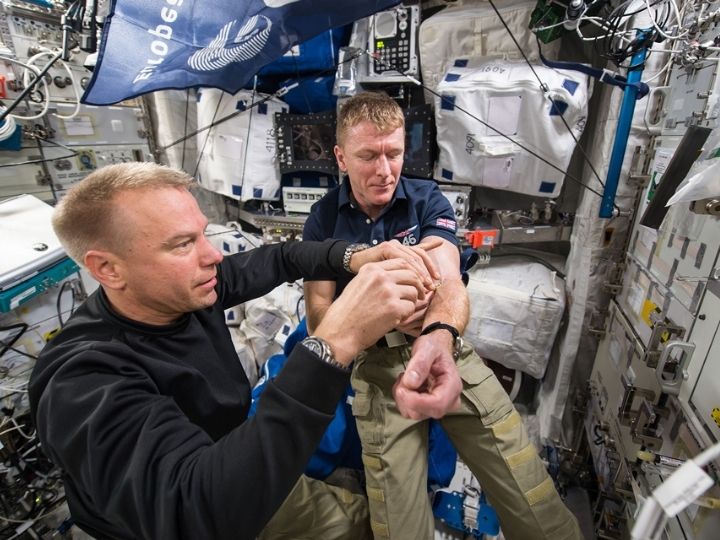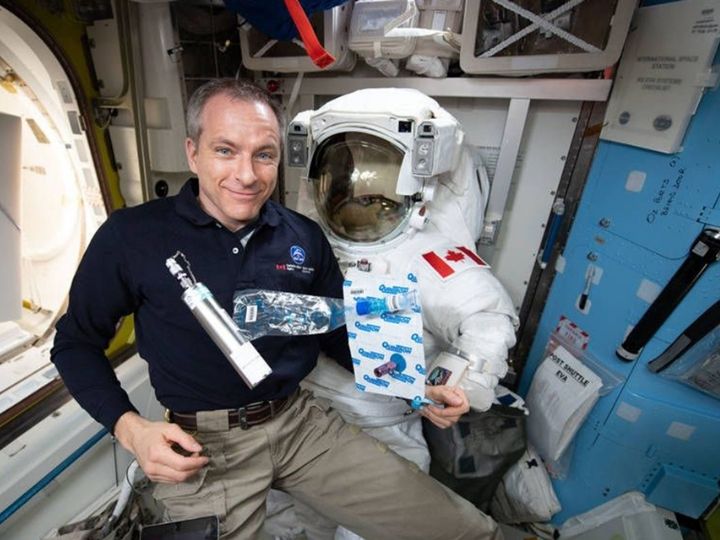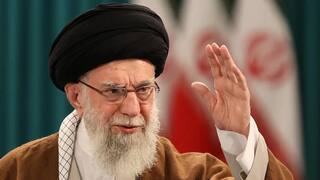Explorer
Space Travel Hits Astronauts' Red Blood Cells Hard. New Study Explains How
A new study has found that astronauts' bodies destroy 54 per cent more red blood cells in space than they normally would on Earth.

David Saint-Jacques and a record number of astronauts on board the International Space Station are collecting blood and breath samples for Canadian study MARROW. (Credit: NASA via Canadian Space Agency)
New Delhi: Space travel can decrease red blood cell counts, a study has revealed. Researchers from The Ottawa Hospital in Canada recently performed an analysis of the blood of 14 astronauts. The study was recently published in the journal, Nature Medicine.
What Happens To Astronauts' Blood In Space?
The astronauts' bodies destroyed 54 per cent more red blood cells in space than they normally would on Earth, according to the study. This phenomenon is known as space anaemia.
Dr Guy Trudel, the lead author of the study, said that space anaemia has consistently been reported when astronauts returned to Earth since the first space missions, but the reason behind this was not known, according to a statement issued by The Ottawa Hospital.
He added that the new study shows that more red blood cells are destroyed upon arriving in space, and this continues for the entire duration of the astronaut's mission.
It was earlier thought that space anaemia is a quick adaptation to fluids shifting into the astronaut's upper body when they first arrived in space. In this way, astronauts lose 10 per cent of the liquid in their blood vessels.
Also, it was believed that astronauts rapidly destroyed 10 per cent of their red blood cells to restore the balance, and that after 10 days in space, red blood cell control was back to normal.
The new study, however, found unexpected results. The red blood cell destruction was observed to be a primary effect of being in space, not just caused by fluid shifts, the study said.
The researchers demonstrated this by directly measuring red blood cell destruction in 14 astronauts during their six-month space missions.
One of the astronauts, Dr David St-Jacques, had stored the materials he used to collect in space, in metal canisters, until they were sent down to Earth and delivered to Dr Trudel's laboratory for analysis.

ESA astronaut Tim Peake tweeted picture of his first blood draw completed in space. The sample was taken as part of the MARROW investigation. (Photo: NASA)
The human body creates and destroys two million red blood cells every second on Earth.
When in space, astronauts were destroying 54 per cent more red blood cells during their six-months stay, or three million every second, the study found. The same results were obtained for both female and male astronauts.
Dr Trudel's team had developed some techniques and methods to accurately measure red blood cell destruction, and had adapted these to collect samples aboard the International Space Station (ISS).
Breath Samples Of Astronauts Precisely Measured
The scientists, at Dr Trudel's lab at the University of Ottawa, were able to precisely measure the tiny amounts of carbon monoxide in the breath samples from astronauts.
The study found that one molecule of carbon-monoxide is produced every time one molecule of heme, the deep-red pigment in red blood cells, is destroyed.
The team did not measure red cell production directly, but assumed that the astronauts generated additional red blood cells to compensate for the cells they destroyed.

Had this not been the case, astronauts would have ended up with severe anaemia with severe anaemia, and would have had major health problems in space.
Significance Of The Study
Dr Trudel said that the findings are spectacular, considering these measurements had never been made before.
He said that having fewer red blood cells in space is not a problem when the body is weightless. But when landing on Earth and potentially on other planets or moons, anaemia affecting the energy, endurance, and strength can threaten mission objectives.
Trudel said that the effects of anaemia are only felt once the astronaut lands, and must deal with gravity again.
As many as five out of 13 astronauts involved in the study were clinically anaemic when they landed, the study said. One of them did not have blood drawn on landing.
Space-related anaemia was reversible, with red blood cell levels progressively returning to normal three to four months after returning to Earth, the study found.
A year after the astronauts returned to Earth, the researchers repeated the same measurements. They found that red blood cell destruction was still 30 per cent above preflight levels.
The findings suggest that structural changes may have happened to the astronaut while they were in space. The red blood cell control was changed for up to a year after long-duration space missions, the study said.
The discovery that space travel increases red blood cell destruction supports screening astronauts or space tourists for existing blood or health conditions affected by anaemia.
The longer the space mission, the worse the anaemia, the new study found. This could impact long missions to the Moon and Mars.
The findings suggest that increased red blood cell production will require an adapted diet for astronauts.
Also, it is unclear how long the body can maintain this higher rate of destruction and production of red blood cells.
The authors noted in the study the findings can also be applied to life on Earth.
Dr Trudel said there is a potential to treat or prevent anaemia, both for astronauts and patients on Earth, if it can be found out what exactly causes it.







































